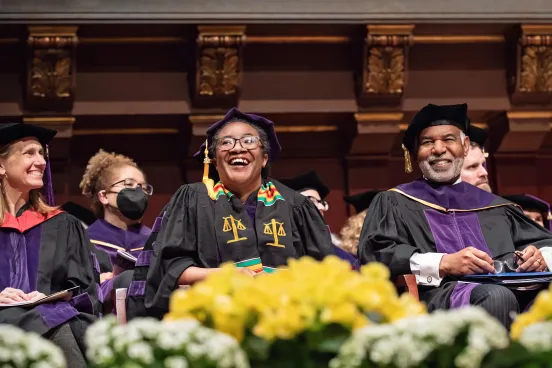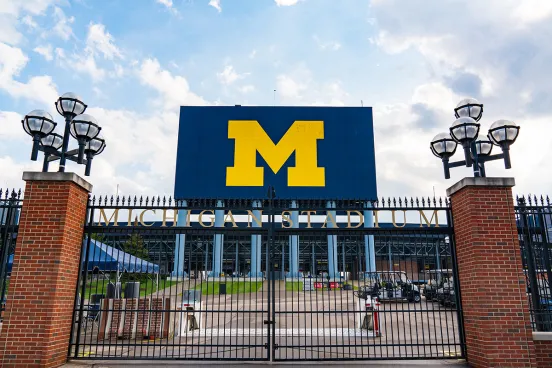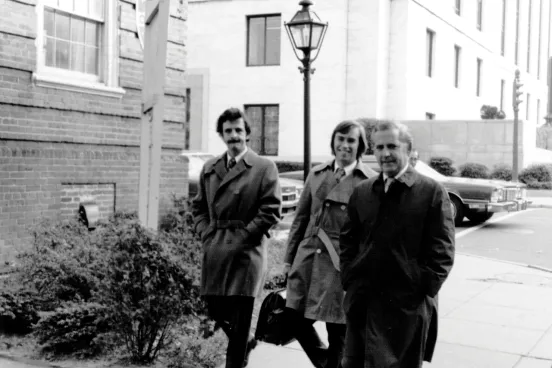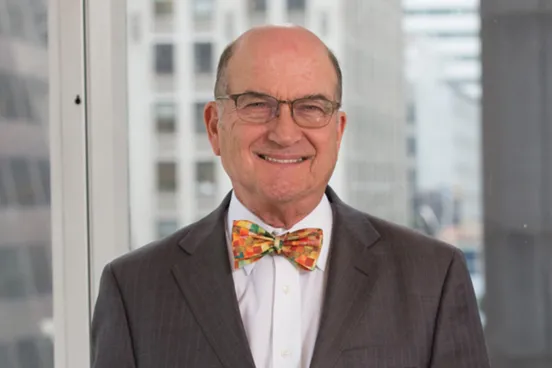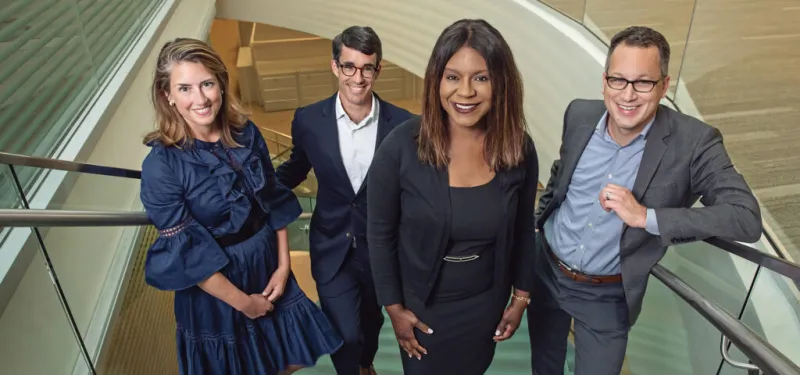
There is an old adage about doctors being the worst patients. So does that mean law professors are the worst clients?
Absolutely not, say three former students of one Michigan Law professor, who now serve as her lawyers in various capacities.
As chief strategy officer at Lear Corporation—a Fortune 500 company based in metro Detroit that supplies seating and electrical and electronic systems for the automotive industry—Alicia Davis has a lot of responsibility. Davis, who has been a professor of law at Michigan since 2004, leads Lear’s central strategy organization, which is made up of four components. The corporate development team is the in-house mergers and acquisitions unit that, among other things, executes acquisitions, divestitures, and joint ventures. Lear’s corporate strategy group works in partnership with the executive team to drive enterprise-wide strategic planning and large-scale strategic initiatives. Lear Ventures invests in automotive and automotive-adjacent technology startups and venture capital funds. And the industry 4.0 team is focused on developing initiatives to enhance Lear’s operational excellence—improving efficiency, quality, and competitiveness.
These varied responsibilities mean that Davis requires a lot of legal counsel—and that’s where three of her former students come in.
From in-class to in-house
Michael Vukich, ’09, has been part of Lear’s in-house counsel team since 2017. Before Davis joined Lear in 2018, Vukich recalls his boss asking if he knew anything about a Michigan Law professor by the name of Alicia Davis who was a finalist for Lear’s head investor relations job. “He laughed when I told him that she had been my teacher.” After she joined Lear, “I very distinctly remembered her voice and demeanor,” says Vukich, who took Davis’s Mergers and Acquisitions class. “And then there she was, not in my classroom but in my workplace. It was a bit surreal at first.”
During the pandemic, after Davis had added corporate development to her existing investor relations responsibilities, she and Vukich “were in the trenches together,” he says, facing vexing decisions amid challenging times as the pandemic impacted the company and its supply chains.
“There were moments where we had to make some tough calls together,” Davis recalls. “Mike was really good at saying, ‘we could do this, but here’s the parade of horribles that will follow, or we could do that, but here’s the parade of horribles, so pick your parade of horribles.’ Because I’ve been a lawyer and I’ve been an investment banker, I think I take bad news about as well as anyone and appreciated his candor. Through it all, I really came to value Mike’s counsel.”
Since then, two deals they’ve worked on together are Lear’s acquisition of the interior comfort systems business of Kongsberg Automotive and the pending acquisition of I.G. Bauerhin, a thermal comfort solutions company. Vukich has been a mergers and acquisitions attorney throughout his career, but he recognizes the uniqueness of the deals on which he advises Davis.
“Alicia’s the one who taught me M&A, and she’s responsible for ensuring Lear’s M&A deals get done with the proper support from in-house counsel. So it’s a situation where she is my internal client for the kind of matter that she taught me how to do.”
A familiar name on a diverse client roster
Neither Sophia Hudson, ’06, nor Joe Morrison, ’13, will bump into Davis in the parking lot or copy room. Both work for private law firms where Lear is one of many clients that retains them.
Morrison is a member at Bodman PLC in Ann Arbor, where his practice focuses on intellectual property and emerging companies and venture capital. Bodman has a longstanding relationship with Lear, and Morrison has advised Davis and Lear Ventures on several investments since joining the firm in 2016.
“Lear Ventures has been relatively active, so there’s a lot of overlap in my and Alicia’s work,” says Morrison, who also is on calls with Vukich frequently. “Whether I’m interfacing directly with Alicia or not, it’s definitely within her purview. I help them think about issues like what the rights and terms are, and what could be negotiated, in connection with a certain investment—or whether an investment candidate is attractive after conducting due diligence.”
Most recently, Morrison worked with Davis on Lear’s investment in CelLink, a startup that makes flat-wire harnesses that move data, power, and signal through a vehicle. Morrison advised Davis on the company’s joint development agreement with CelLink and governance rights.
“I’ve been doing transactional work for a while, so the questions I ask counsel tend to be in areas not directly in my wheelhouse,” Davis says. “For example, I have experience doing venture capital deals, but Joe does them every day and for a broad range of clients, so he can tell me about the precedents he’s seeing in the marketplace and can advise me with a more holistic view than I have on my own.”
While Morrison’s firm had a relationship with Lear that predated both him and Davis, Hudson was a bit of a rainmaker in helping her firm advance its relationship with Lear.
Hudson, a capital markets partner in the New York office of Kirkland & Ellis, heard a partner in the M&A group mention trying to make contact with Lear. Hudson, who had kept in touch with Davis since graduation and knew Davis had moved to Lear, said that she knew just the right person. That led to an introductory Zoom call that resulted in Hudson and Kirkland & Ellis signing on to do transaction-related advisory work for Davis and Lear.
“I would say that our relationship opened the door,” says Davis, who was a lawyer at Kirkland & Ellis before joining the Michigan Law faculty. “But Lear’s general counsel and I agreed that it was Sophia’s capabilities and the capabilities that her firm brought that got them hired.”
Hudson has counseled Davis on a number of matters, including some advisory work related to the Kongsberg Automotive acquisition. “Sophia has a strong background in securities law and corporate governance, so she has been very helpful as I work through questions about governance in the context of a transaction,” Davis says.
Hudson adds, “We have a productive relationship because it’s always a back-and-forth discussion, a partnership to get to the best answer.”
So does it feel weird?
While both the professor and the students admit to some worlds-are-colliding feelings, all readily agree the respect is mutual.
“Sometimes when we talk, I feel like she’s setting up a hypothetical for a classroom discussion,” says Hudson, who took the first class Davis ever taught at Michigan Law, Enterprise Organization, as well as Mergers and Acquisitions. “She does the same thing now that she did then: She’ll explain the discussions behind the discussion and the strategic rationale for the topic. And then she’ll tell me to tell her what she should be thinking about, given the set of facts that she presented.”
Morrison, who took Mergers and Acquisitions and Investor Protection with Davis, says, “It’s crazy that I’ve known [Davis] since I really didn’t know a whole lot about the law.” He still has a classroom mentality when it comes to their interactions. Since those interactions are billable hours, Morrison says he is acutely aware of the need to give her, and all of his clients, what they’re paying for. “She is C-suited in a huge company, so I’m really mindful of her time. I never wanted to show up for her class unprepared, and I’m definitely not showing up to a call with her unprepared. I’m the one being called on in this proverbial class, and I want to be ready to go.”
One key difference, though: “I can’t call her Professor Davis when we’re on an actual work call,” Morrison notes.
For Davis, her work with Vukich, Hudson, and Morrison provides a satisfying answer to the I-wonder-whatever-happened-to-so-and-so that often haunts teachers.
“It’s incredible to see how people I met when they were first embarking on their legal careers have become such incredible lawyers. Now we operate as peers and I absolutely learn from them. It’s not like I’m the professor and they’re the students who will always be under my tutelage. They’ve branched into different specialties and experienced things that I haven’t. I rely on them.”



